There are elements that allow you to transform the interior, and make it as beautiful and comfortable as possible. Add an aquarium with marine life to it, and a bright highlight will appear in it. We have compiled a rating of the best organic soil for an aquarium, taking into account the opinions of experts and ordinary buyers. By studying it, beginners will be able to support the natural processes in the artificially created natural world.
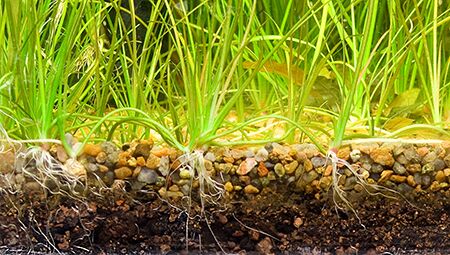
Table of Contents
best organic soil for aquarium
| best organic soil for aquarium | Rating |
| gravel and sand | Buying them is the easiest and cheapest way to shape the relief inside the aquarium. |
| Soil-based on pure sand | Natural soil allows water to circulate |
| Baked clay | This is a neutral product that does not affect the quality of water in any way. |
| Marble chips | This type of soil is suitable for filling a freshwater aquarium. |
| Power Sand Special M (ADA) | The basis is a porous material, mineral fertilizers, peat, and beneficial bacteria are added to it. |
| Substrate Deponit Mix | Another quality nutritional mix |
| coral crumb | Suitable for creating pseudo aquariums |
| Tetra Complete Substrate | Nutrient substrate for long-term plant nutrition |
| artificial soils | This is a common name for glass beads and brightly colored plastic pebbles. |
gravel and sand
Buying them is the easiest and cheapest way to shape the terrain inside the aquarium. The mixture is suitable for growing most small and large fish. Unpretentious breeds will feel as comfortable as possible here.
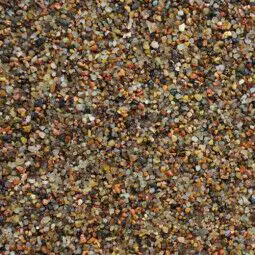
The substrate is quickly populated by beneficial microorganisms, which can then be fed by fish and plants. To make them all feel as comfortable as possible, you need to buy gravel with a fraction of 5 and sand 2 mm. Pebbles should have a run-in shape without sharp edges. Then the marine life will not get hurt.
Pros:
- Natural soil allows water to circulate
- Does not affect the composition of water
- Look natural, natural
- inexpensive way to fill an aquarium
Cons:
- Plants do not grow well in the mixture, you will have to buy additional fertilizers for them
- The soil is not suitable for fish that like to burrow into the bottom and stay inside the soil for a long time.
Soil-based on pure sand
From 120 rubles. per kgThe substrate is packaged differently, so everyone will find a suitable packaging option for themselves.
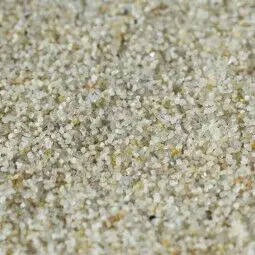
Some manufacturers offer ready-made mixtures for filling aquariums. For their manufacture, river sand with an average granule size is used. It is pre-washed without the use of chemicals, calcined on fire. With it, you can fill aquariums with fresh and salt water.
Pros:
- Composition natural
- It does not affect the composition of water in any way, does not change its pH.
- Soil universal
Cons:
- Nondescript gray color
baked clay
This type of soil is neutral, so it does not affect the water quality in any way. Its application helps to create a natural appearance of the filling. The bottom dwellers in it will feel completely safe.
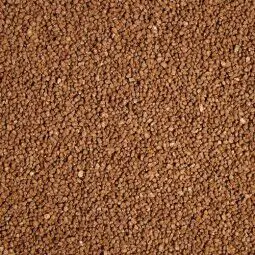
Clay has a porous structure. It is perfect for settling bacteria that process silt deposits. Expanded clay is a sorbent that performs the function of natural water purification, clearing it of excess fertilizers. The choice of soil ensures that excessive algae growth is prevented.
Pros:
- Natural appearance
- Safe streamlined shape
- Chemical neutrality
- porous structure
- Natural adsorbent
- Easy aquarium cleaning
Cons:
- Contains no minerals for plant nutrition
- Only large plants with long stems can be planted in expanded clay
Marble chips
This type of soil is suitable for filling an aquarium with fresh water. It will perfectly refresh the appearance of the reservoir, create an incredible atmosphere.
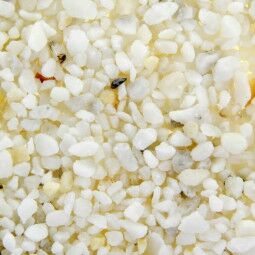
There are marble chips of different colors (white, black, colored), different sizes (from 2 to 10 mm), so you can fill large and small artificial reservoirs. Fractions are smooth. They do not have sharp edges. Marble does not change the pH of the water, but slightly increases its hardness. Experienced aquarium fish lovers use a similar substrate for rooting aquatic plants.
Pros:
- Successfully performs its main functions
- Easy to find for sale
- Material natural
- His choice helps to improve the aesthetic component of the landscape.
Cons:
- Color fades over time
- It is impossible to use marble chips to keep fish that love to swim in soft water.
Power Sand Special M (ADA)
The basis is porous material, mineral fertilizers, peat and beneficial bacteria are added to it. This composition is excellent for high-quality rooting of aquatic plants. It can be used in the formation of a new aquarium, used to improve the soil of an existing reservoir. Due to the presence of a large number of nutrients in the composition, it is possible to ensure the rapid growth of flora and high-quality water circulation.
Pros:
- Long-term stimulation of plant growth
- good circulation
- Ideal soil for growing shrimp
Cons:
- Over time, the soil disintegrates, dust forms, which is difficult to remove from the aquarium.
- The cost is very high
Substrate Deponit Mix
Another high quality nutritional supplement. We recommend buying it if you actively grow a large number of a wide variety of green plants in an aquarium.
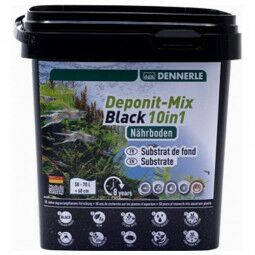
The composition contains mineral and organic substances. You can use the substrate as an independent soil, you can use it to make the top substrate and combine with gravel. Fertilizers slowly dissolve in water, which ensures constant feeding of greens.
The kit includes instructions. It describes in detail all the features of the use of the mixture, the doses are indicated.
Pros:
- Provides ideal conditions for plant growth
- Has a long-term effect on the maintenance of the nutrient medium
- Prevents algae growth
Cons:
- Can only be combined with neutral soils
- The composition contains particles that cause caking of the soil, which is why its lower layers quickly turn sour
coral crumb
It is perfect for creating pseudo aquariums. With it, you can form any terrain, and the landscape will look great.
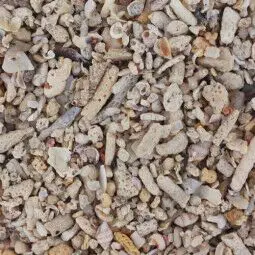
Since the coral crumb has a high chemical activity, the hardness of the water in which it is immersed rises to critical levels. Only a few species of fish can live in such an environment. Mostly cichlids. In nature, they live in African rivers, in the reservoirs of Central America, in the Amazon. Only a few pairs of such beauties can be placed in a vessel of 120 liters. They will feel great in artificially created conditions.
Pros:
- The little one looks good
- The material is natural in nature.
- Manufacturers sell the crumb ready for use (no need to rinse and burn it)
- Pieces of corals are run-in, fish cannot get hurt on them
- The structure is porous
Cons:
- The top layer of crumbs will have to be constantly cleaned, as it quickly becomes clogged.
Tetra Complete Substrate
The soil is suitable for the permanent feeding of green spaces. It contains quartz sand. It stimulates the active development of the roots.
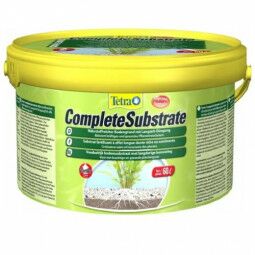
A large amount of iron affects the strength of algae. Their color becomes saturated, which makes the landscape of the aquarium look especially impressive. Peat neutralizes the pH shift towards an acidic environment.
Pros:
- Contains no harmful chemicals
- The relief formed with Tetra Complete Substrate acts as a natural filter
- The rest of the food, settling to the bottom, rots and becomes a source of nutrition for plants.
Cons:
- The cost is high
artificial Glass beads
This is a general term for glass beads and brightly colored plastic pebbles. Such elements are actively used to create a vibrant landscape. The relief is colorful, juicy, complex, and interesting. Mixtures are suitable for decorating an aquarium in which fish can live that do not like to burrow into the soil.
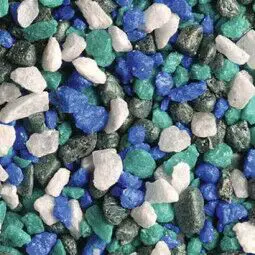
Pros:
- The filling does not affect the composition of the water
- Natural circulation is not disturbed
- Easy to care for glass or plastic chips
Cons:
- Unnatural
- Not for plants
How to choose Organic Soil for aquarium
The top of the best organic soil for aquariums, compositions for growing aquatic plants, and crumbs for creating a pseudo-sea. In order not to make a mistake with the choice of suitable soil, you need to take into account a variety of criteria. The properties of the substrate itself, the purpose of the aquarium, and the type of fish that will swim in it are important. There are those among them who like to swim on the surface of the water, there are those who prefer to dig in the soil, burrow in it and spend a long time in this form. For the first, soils are more suitable, which include large pebbles. For the second – small.
In fine-grained soil, small plants with small roots can be grown. In coarse-grained, strong plants with a branched root system grow well. The shape of the elements must be round, streamlined, and smooth. If there are chips and stones with sharp edges, it is better to refuse the purchase right away: the fish may get hurt.
If porous elements are present in the composition of the soil, this will favorably affect the microclimate: water circulation will improve, and beneficial microorganisms will settle on the surface of the pebbles. Plants and fish will feed on them.
Organic soils and substrates after processing
Their choice will increase the hardness of the water and change its pH composition. Not all marine life can live in such an environment. Therefore, before equipping an aquarium, aspects of this kind must be taken into account.
Artificial mixtures
Beneficial microorganisms do not settle on the surface of synthetic elements. There are no necessary minerals for plant nutrition. Therefore, it is useful to make thin bedding from them and lay natural mixtures on top, 7 cm thick.
We hope that our article will help you decide and make the right choice. If you like it, please like and share your opinion in the comments.